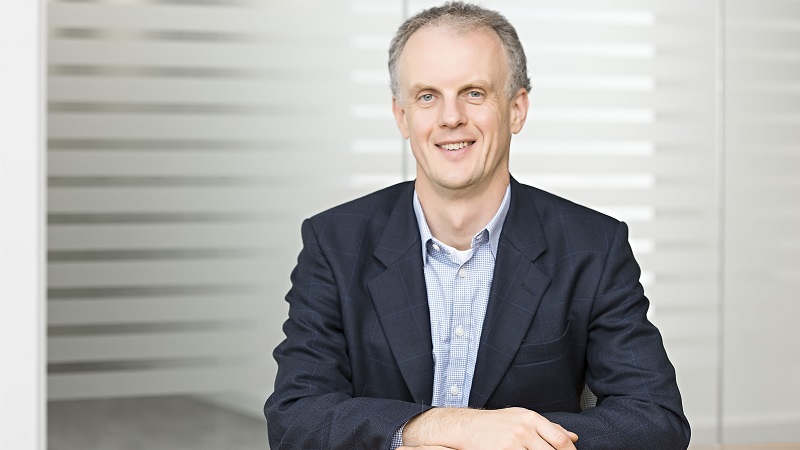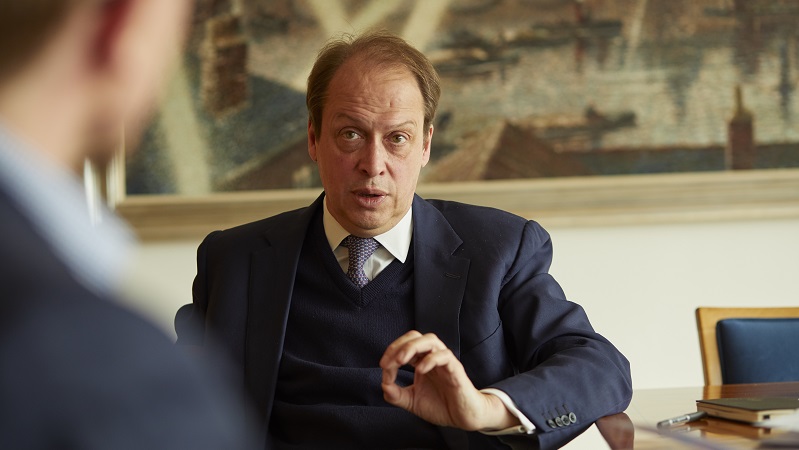Thirty-four years as a fund manager means Guy Monson has weathered a fair few market cycles, and he’s particularly proud of how many crashes he has held money through.
The founding partner at Sarasin & Partners reels off the downturns of 1987, 1994, 1997, 1998, 2000 and 2008 as hard-earned battle scars, but when it comes to the 2011 euro crisis, despite the bloc’s economic woes at the time, he is not so certain it was a full-on crisis.
According to Monson, the eurozone crisis was a manifestation of a design flaw that remains evident today: that Europe is overly reliant on external trade and there is far too large a surplus in Germany, not to mention Italy’s “debt trap” economy.
The impact of this structural issue was brought to light at the European Central Bank’s press conference on 7 March, he says. The bank’s announcement that it would keep rates on hold for the rest of the year and launch a series of quarterly, targeted longer-term refinancing operations in a bid to boost growth was a sign that the economic outlook is far from rosy.
“A year ago we were cheering a simultaneous global recovery led by Germany,” says Monson. “A year on, we have seismic growth cuts, possibly permanently zero-bound interest rates and – I know the phrase is over used – a ‘Japanification’ of Europe.”
He adds: “Remember, Keynes always said that an excessive surplus is as disruptive as an excessive deficit.”
Monson also draws on the wisdom of Keynes when discussing Italy, saying the country needs either aggressive reflation or substantial devaluation to address the economic woes brought about by political chaos and its failure to form a stable coalition.
On Europe’s general structural issues, Monson adds: “It’s interesting to see a political system where that diagnosis has broadly been accepted for almost 20 years; we’re just dealing with it.”
But despite a negative picture in Europe, Monson does not believe we are on the brink of another recession. His diagnosis is that the European economy is struggling to reflate, noting Japan proved that with high debt levels but extremely aggressive monetary support it is possible to run for a long time at extremely low growth.
“I don’t think we’re facing a recession but we are looking at quite disruptive tools that we hoped we had put back in the cupboard, namely negative interest rates, quantitative easing and targeted loans to banks.”
A glimmer of hope is that such a generous interest rate backdrop and the resulting liquidity means that if you get investments right and find growth opportunities in a low-growth world, you stand to benefit, says Monson. The question, of course, is where these opportunities are to be found.
Variations on a theme
Sarasin & Partners is believed to be a pioneer of the thematic investing approach, launching the first such portfolios in the mid-’90s. There are currently three themes exciting Monson for the £393m Global Higher Dividend Fund he co-manages with Neil Denman, with Julian Bishop as deputy manager.
Two of these themes are modern – climate change and automation – and the other is “good old-fashioned yield”.
Monson says the growing demand for energy from parts of the developing world that need electrification, such as Africa, has moved climate change from a strategic threat to an economic opportunity.
“Most people think electrification requires about a 14% increase in electricity,” he says. “It’s that low because we’re actually reducing energy consumption in the rest of the world, but we’ve got to do it with substantially less carbon. That to me is not a threat; almost every citizen in the world is happy with that agenda. It’s an enormous investment opportunity and I think capital spend will be extraordinary.”
To play this theme, names in the portfolio include Fortune 250 wind and solar utilities firm NextEra Energy, the fourth-largest holding at 3.2%, and Danish offshore wind farm operator Orsted, which has a huge programme of floating turbines in the UK with “blades the width of an A380 aircraft”.
Other notable positions include Belgian battery recycler Umicore and Danish firm Novozymes, which makes enzyme solutions to improve energy efficiency in products such as laundry detergents and food manufacturing processes.
“You’ll notice three of those four are European,” says Monson. “You’ve got this interesting dynamic where there’s a structural problem in Europe but extraordinary leadership in the environmental space.
“Umicore, Novozymes and Orsted are absolute leaders in their fields and I think they are going to become bellwether stocks people will be talking about.”
The second theme is automation and productivity, demonstrated enthusiastically by Monson using the model of an aeroplane factory with a fully automated process involving the internet of things and a 3D printer that produces parts and engines with predictive maintenance capability.
“Complete automation of the factory delivery is not just a dream in science magazines. It is happening as we speak, and speeding up extraordinarily with big data and the internet of things.”
Names in the portfolio that exploit this theme include French-domiciled engineer Schneider and British engineering company IMI.
Another part of this theme is autonomous driving. Monson describes Google’s self-driving technology development company Waymo as a “hidden jewel”, way ahead of its competitors when it comes to the number of miles clocked up. For this reason, Monson owns Alphabet.
“Waymo is talking about 2019 legal autonomous driving in parts of California and 2020, the first robo-taxi service at low speeds in urban environments,” he says. “The key stat will be at what point in a low-speed urban environment a robo-taxi service is safer than a human-driven vehicle. I don’t think we’re far away. We’ll get to a point where a robo-taxi going at 25mph will be safer than a black cab.”
The issue with certain stocks affiliated with the automation theme, however, is that they don’t pay dividends, which is why the fund’s exposure to this theme is lower than the others. Monson is also avoiding autos at the moment because of emissions problems, which is the obvious place to play the theme.

Bond-like behaviour
The third theme is the more traditional global equity dividend yields. Monson believes certain stocks offer an unprecedented premium over cash and bonds. Looking at the dividend yield of the UK market including share buybacks minus the 10-year bond, in 1990 a UK bond yielded 7.5% more than a UK equity, whereas today a UK equity yields 3.25% more than a UK bond.
“There’s been an astonishing reversal and you can begin to do with quality thematic ESG-rich equity what you used to be able to do with corporate bonds.
“The problem is that government bonds and short rates have been trashed by QE and the chase for yield has squeezed high yield extremely tight. Issuance quality has plummeted and 50% of the major issuance in 2018 has been BBB or below.”
He says while Lloyds, Shell and Rio Tinto might not be perfect companies, they will deliver shareholder returns – dividends, specials and share buybacks – in excess of 10%. In that time they will reduce their gearing and, in Lloyds’ case, improve its capital ratio.
“I’ve been in the business 34 years and I’ve never seen anything like that,” he says.
Lloyds is the top holding in the Global Equity Opportunities Fund at 3.8%, which Monson runs with Alex Hunter.
In the Global Higher Dividend Fund, Monson picks out Bridgestone, Texas Instruments and Italian energy company Enel from the top 10 for their dividend attributes. Closer to home, he champions Admiral and BT Group.
“It’s almost a bond fund dressed up as an equity fund,” he adds.
Last year, Global Higher Dividend was down 1% but 2.2% above the index. The fund is benchmarked against the MSCI World rather than the MSCI All Companies as Monson is not convinced the progressive dividend culture is baked into the management thinking across emerging companies. As a result, the fund has lower emerging market exposure compared with its peers. Over one, three and five years the fund has returned 8.2%, 38.8% and 69.7%, respectively, versus the IA Global Equity Income sector’s 6.6%, 35% and 49.4%.
ESG ratings
The portfolio has about 40 holdings and each stock must meet the fi rm’s proprietary ESG criteria because, as Monson says, “the greatest risk of bad ESG lies in the dividend”.
He explains: “If you look at these crises, the first thing to go is the dividend. Most people think ESG should be applied to growth portfolios.
“I believe the reverse, that if you are a long-term retiree caring about your income over multiple business cycles, your number one risk is not the macro, but a government or environmental failure that fundamentally alters the economics of a company.”
That said, Monson admits it is not possible to avoid every mistake. The fund was a holder of Wells Fargo when the cross-selling scandal broke in late 2016, although looking back he does not see it was a capital issue nor does he think the dividend was at risk.
On the other hand, Monson says even though it was a tough decision, he was particularly proud of selling out of Nissan 18 months ago after becoming worried about the lack of governance controls at the top. The auto manufacturer went on to endure an emissions scandal in June last year before former CEO Carlos Ghosn was arrested in November on allegations of under- reporting earnings and misuse of company assets.
“Nissan’s quite a high yielder with a big electric car division, so you’d think it hits your climate change, automation and yield button, but the ethics failed.”











